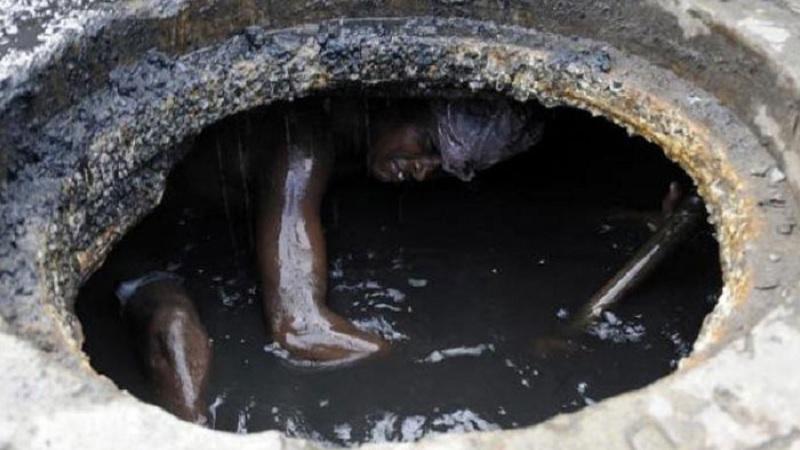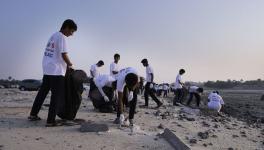Dalit Man Forced to Enter and Clean Sewer in Gujarat

In a day and age when manual scavenging should be a thing of the past, a Dalit man was forced to enter a sewer to clean it in Gandhinagar. The man identified as Amar Singh Vasava was forced to clean a choked up drain in Navratri Chowk in Sector 3B on Thursday, that too without any safety gear!
The incident came to light when Jignesh Mevani, the independent MLA from Vadgam tweeted about it:
गुजरात के पाटनगर गांधीनगर के स्केटर 3-B में
नवरात्रि चोक के पास आज भी एक सफाईकर्मी को गटर में उतारा गया। @dgpgujarat आप तुरंत करवाई करें। पिछले 3 महीने में यह तीसरी बार हुआ है। मामले में तुरंत FIR और गिरफ्तारी होनी ही चाहिए। @CollectorGnr @CMOGuj @PMOIndia pic.twitter.com/KdKoo6OAFm— Jignesh Mevani (@jigneshmevani80) January 6, 2022
Mevani pointed out how this had been the third time such an incident had taken place in the last three months and demanded that an FIR be filed immediately.
Following this, police filed an FIR at the Sector 7 police station of Gandhinagar against a supervisor named Parthiv Lathia, who works for Khilari Infra Private Limited, a Navi-Mumbai-based company that has a six-month contract for repair and maintenance of drains in the area. Lathia was booked under sections of the Scheduled Caste and Scheduled Tribe (SC/ST) Prevention of Atrocities Act, Prohibition of Employment as Manual Scavengers and their Rehabilitation Act, and IPC 336 for negligent act endangering human life.
The Indian Express quoted an excerpt from the complaint: “Lathia had asked Vasava, a Bharuch native, to enter the drainage without any safety gear. However, as per the conditions of the tender received by Lathia’s agency, no worker can be made to enter the drainage.”
Dalits have faced exclusion and discrimination for centuries, often forced to take up degrading and dehumanising work like manual scavenging. This practice is common even today, despite the fact that legislations exist to protect the rights of people hailing from Scheduled Castes and Tribes, and there is even a law that prohibits people from being employed as manual scavengers - Prohibition of Employment as Manual Scavengers and their Rehabilitation Act.
Ideally this work should be done using machines. Manual scavengers not only suffer from a multitude of health problems due to constant exposure to untreated sewage and waste, they also lose their lives in the line of duty, due to poor safety standards.
Just over a month ago, a sanitation worker died in Varanasi after being trapped in a sewer line for 18 hrs! Meanwhile, the Centre has contradicted itself on the matter of deaths of manual scavenging.
In July 2021, in a written response submitted to the Rajya Sabha, the Social Justice and Empowerment Ministry admitted that the inhuman practice of manual scavenging is still prevalent in India with over 60,000 manual scavengers identified across the country. Ramdas Athawale, the Social Justice and Empowerment Minister informed the Rajya Sabha through his written answer on July 28, that no deaths due to manual scavenging were in the last five years. Interestingly, this answer by Ramesh Athawale contradicts his own written reply dated February 2, 2021, where he had stated that the reported number of deaths stood at 340 across 19 States, with Uttar Pradesh topping the list at 52 deaths, as reported previously by SabrangIndia.
This elicited outrage by human rights defenders. Leading the charge was Bezwada Wilson, the national convenor of the Safai Karmachari Andolan.
472 deaths from 2016 to 2020 and 26 deaths this year till date due to manual scavenging are recorded with details of each incident sent to central government! Still it keeps denying even a single death!! Shameful!!#ManualScavenging #stopkillingus
— Bezwada Wilson (@BezwadaWilson) July 31, 2021
Interesting in August 2021, while replying to a question tabled in the Rajya Sabha, Minister of Social Justice and Employment, Virendra Kumar, informed the Parliament that 941 deaths related to cleaning sewers and septic tanks have been recorded across 21 States and Union Territories, but there are no reports of death due to manual scavenging! This is rather odd, because if people did not enter these sewers and septic tanks to clean them (as manual scavengers do), then how did they die? If people did not enter these sewers and septic tanks, that means machines were being used. But how did that kill the people?
The Ministry's written answer said, “There is no report of death due to manual scavenging”, but it revealed figures pertaining to deaths of workers while cleaning sewer/septic tanks. The highest number of deaths has been reported from the States of Tamil Nadu (213), followed by Gujarat (153), and then Uttar Pradesh (104).
Get the latest reports & analysis with people's perspective on Protests, movements & deep analytical videos, discussions of the current affairs in your Telegram app. Subscribe to NewsClick's Telegram channel & get Real-Time updates on stories, as they get published on our website.
























